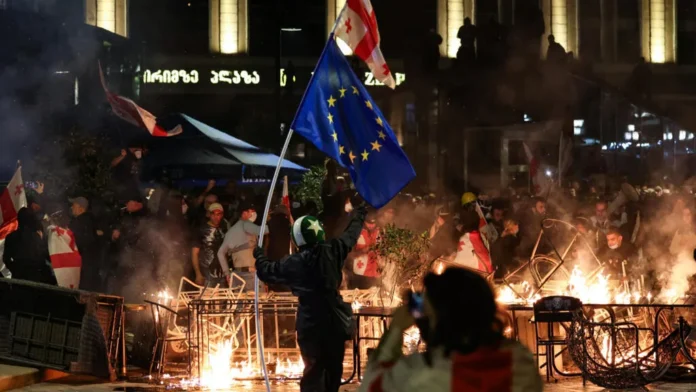Georgia’s Prime Minister Irakli Kobakhidze on Sunday vowed a sweeping crackdown on opposition groups after police clashed with demonstrators who tried to storm the presidential palace during a tense election weekend he described as a coup attempt.
Saturday’s local elections were the ruling Georgian Dream party’s first major political test since a disputed parliamentary vote a year ago triggered nationwide unrest and led the European Union to freeze Georgia’s accession bid.
The central election commission said Georgian Dream had won municipal council majorities in every district and secured landslide victories in mayoral contests across all cities.
The normally low-profile polls took on heightened significance after months of raids on independent media, restrictions on civil society, and the imprisonment of dozens of government critics and activists.
On election day, tens of thousands of anti-government demonstrators filled Tbilisi’s Freedom Square following opposition calls for a “last-chance” protest to defend democracy. Later, a group of protesters attempted to break into the presidential palace. Riot police responded with tear gas and water cannons to disperse the crowd.
The interior ministry announced that it had opened an investigation into “calls to violently alter Georgia’s constitutional order or overthrow state authority” and arrested five protest leaders. They face prison sentences of up to nine years.
Among those detained was 70-year-old opera singer and activist Paata Burchuladze, who had read out a declaration at the rally declaring “power returns to the people,” calling the government “illegitimate” and announcing a transition. Local television reported that he was arrested while receiving treatment for a heart attack in a Tbilisi hospital.
“Several people have already been arrested — first and foremost the organisers of the attempted overthrow. No one will go unpunished… many more must expect sentences for the violence they carried out against the state and law-enforcement.” Kobakhidze told reporters.
He claimed the authorities had “foiled an attempted coup planned by foreign intelligence services” but did not provide further details. He accused the opposition United National Movement, founded by jailed former president Mikheil Saakashvili, of being part of a “foreign agents’ network.”
“This political force, the foreign agents’ network will be completely neutralised and will no longer be allowed to be active in Georgian politics,” he said.
Saakashvili had urged his supporters to stage a “last-chance” protest to “save Georgian democracy.” The ruling party has pledged to ban all major opposition parties.
Rights groups say around 60 people — including opposition figures, journalists, and activists — have been imprisoned over the past year. Amnesty International criticised the elections as taking place “amid severe political reprisals against opposition figures and civil society.”
In power since 2012, Georgian Dream has been accused of democratic backsliding, moving closer to Russia, and stalling the country’s EU membership ambitions. The party rejects the allegations, saying it is protecting “stability” from what it calls a Western “deep state” seeking to drag Georgia into the war in Ukraine with the help of the opposition.
Analysts say the party’s message, that the opposition wants war while it offers peace, resonates with rural voters and is reinforced by disinformation campaigns.
A recent Institute of Social Studies and Analysis poll put Georgian Dream’s approval rating at 36 percent, compared to 54 percent for opposition groups.

